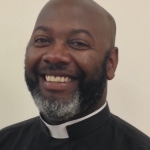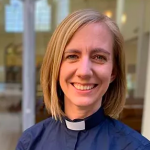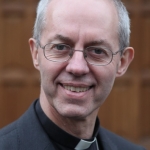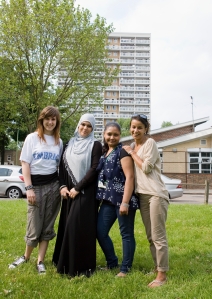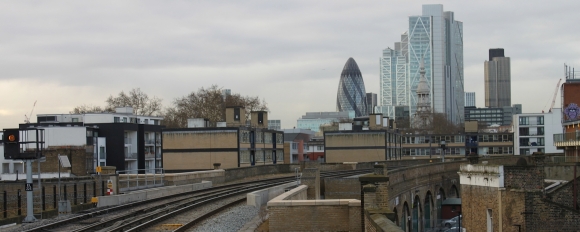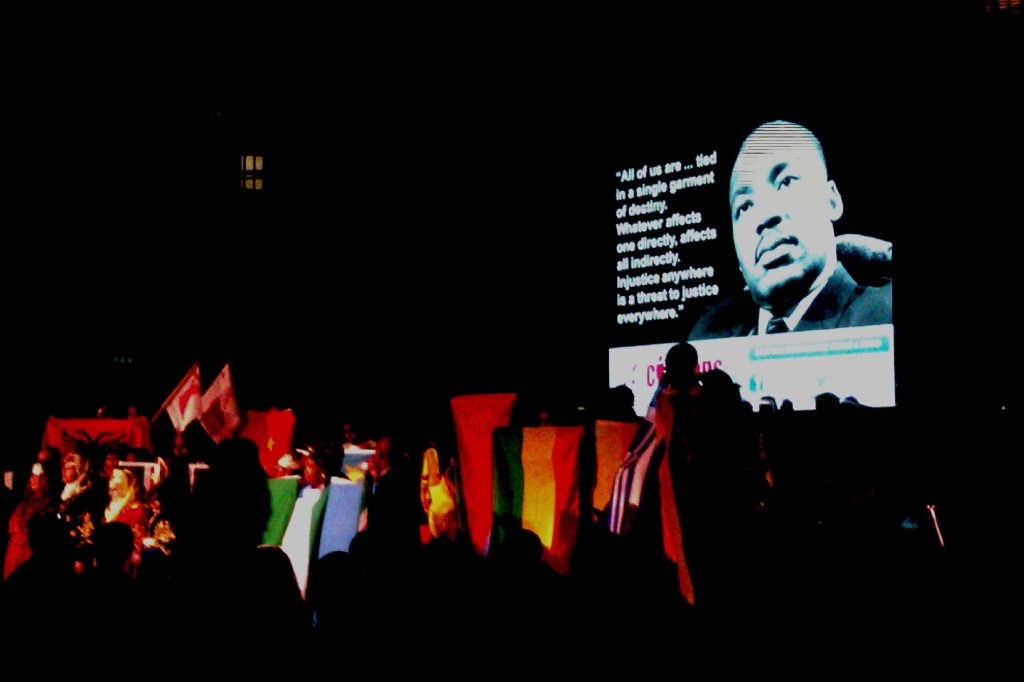 CTC’s Communications Officer Andy Walton preached last Sunday (16 February 2014) at St Peter’s Bethnal Green, as part of its “Just Church” sermon series on mercy, justice and evangelism.
CTC’s Communications Officer Andy Walton preached last Sunday (16 February 2014) at St Peter’s Bethnal Green, as part of its “Just Church” sermon series on mercy, justice and evangelism.
His sermon took as its text Deuteronomy 30.15-20
I’d like to know what you all had for breakfast today. Can we take a quick poll?
Ok, so hands up for cereal. Hands up for toast. Hands up for full English. Hands up for something a little more exotic. Hands up those who slept through the alarm and grabbed something so you wouldn’t be late for church…
One of the big decisions that I face every day is what I should eat for breakfast. You know what it’s like. You feel like you should eat something healthy like yoghurt and fruit or something like that, but especially when it’s cold and wet and windy outside, you feel like having something a bit more bad for you…
But every day I’m faced with this choice. Since I was about 10 I’ve made my own decision about what to have for breakfast. So when I was a student, I chose to eat that cold pizza that was left over from yesterday. I don’t do that so much these days, but I still have a choice to make. When I’m being good I choose to have some porridge and fruit. But even if I choose to eat something bad for me, it’s my choice. I live with David and Hannah and they would never dream of telling me what to have for breakfast or denying me my choice. Sometimes David raises his eyebrows, such as when I had four Weetabix the other day (I think that’s a sensible number of Weetabix, but he disagrees!) but all joking aside, the choice remains entirely open to me as to what I eat.
But maybe the choice I make isn’t that much of a choice after all. Some of you will have seen this picture when it did the rounds on social media a couple of years ago, but it’s worth looking at again. It’s actually American, but has a big overlap with what we eat here in the UK. It shows all the major food types and shows which brand owns which. Have a look at how few companies own basically all the food we eat. Between them, 10 global mega-corporations own it all.
So even if I decide to have Quaker Oats, which sounds wholesome and British, I’m actually buying something from Pepsi. Look over there on the right. If I decide to eat Ben and Jerry’s Ice Cream cos it’s all quirky and independent, well it’s actually owned by the same people as Walls, Magnum, Cornetto and loads more.
It’s the same when it comes to other areas of life isn’t it? So much of what looks like choice is actually an illusion. Think about phone contracts – there are millions to choose from, but all they really do is allow you to make phone calls. What about phones themselves? There are so many to choose from. But all of them are made of the same stuff inside. And the people who make them in China still work in the same pretty awful conditions whatever the brand name is on the front.
The best satire of this illusion of choice I’ve seen is, of course, from the Simpsons. Here’s Homer and Barney doing a tour of the Duff Beer factory. Can you spot what’s happening here? It’s the illusion of choice. Our society tells us we’re at our most free when we’re spending money. It tells us that the best way we can spend our Sunday is not in church or with our families or enjoying creation, but in the Westfield Centre, getting out our credit cards for another thing that the marketing departments have told us we need!
This has seeped into other areas of life as well. Parents are now told they have the right to choose any school for their children, rather than going to a good local school. Students are encouraged to shop around when choosing a university as if they’re supermarkets, there’s even an idea of choice in which hospital we use now, rather than just going to the closest one.
But this isn’t real choice.
Real choice is about something far more profound than that and we heard about it in our first reading. The final two verses of the reading from Deuteronomy are God addressing His people: “This day I call the heavens and the earth as witnesses against you that I have set before you life and death, blessings and curses. Now choose life, so that you and your children may live and that you may love the Lord your God, listen to his voice, and hold fast to him. For the Lord is your life and he will give you many years in the land he swore to give to your fathers, Abraham, Isaac and Jacob.”
So God has told the people about real choice. Life or death. Blessings or curses. And then He tells them straight – choose life. When God addresses them here, the people of Israel are slaves in the desert. They are at a crossroads – will they choose life or will they choose death? You would think it an easy choice to make – life actually please!! But just as in the Garden of Eden the ways of death (“surely you will not die if you eat the fruit of that tree”) seems so much more attractive than the ‘boring’ ways of life’ (“everything else is for you”!). And why is this the case? Well, because, just like us, they were people who were always likely to choose the path of sin rather than the path of following God.
For the Hebrew slaves that are becoming a nation, the patterns of living seen in the surrounding peoples will test their own sense of call and identity. As they move among the new nations, will they hold on to what they have known to be true (being led and fed in the wilderness, seeing the glory of God) or will they be lured away by other things that appear true as well. As they enter to transform the lands around them will they unwittingly be transformed by them? Going in God’s image – whose image will they become? They take with them the laws and festivals which will help them remember who they were and now are. They are called live out the life they have been given, which aims to create ‘holy habits’ that will continually offer the ‘path of life’ for them. But will they choose it?
Well, spoiler alert, the rest of the Old Testament is basically the story of the people of God chopping and changing constantly between choosing life by following God and choosing death by straying away from Him. The prophets try numerous times to call them back to life but they carry on repeating the same bad choices. They keep choosing death.
In fact, in our Gospel reading this morning, we heard Jesus explain just how badly wrong things can go. “You have heard that it was said to the people long ago, ‘You shall not murder, and anyone who murders will be subject to judgment’ Ok, so far so good. Most of us aren’t murderers. But hang on, Jesus takes it to a new level. “I tell you that anyone who is angry with a brother or sister will be subject to judgment. Again, anyone who says to a brother or sister, ‘Raca’ is answerable to the court. And anyone who says, ‘You fool!’ will be in danger of the fire of hell.” So, in other words, we’re all in trouble. To an extent, we’ve all chosen death rather than life because none of us have been able to live up to the standard that God sets for us.
But Jesus is angry here for another reason. He knows that these seemingly little things add up. When we all make sinful and selfish decisions, it leads to systemic injustice. The kind of world in which 10 companies own all the food we eat, yet millions of people go hungry every day.
This is the story of the crucifixion as well. A series of bad and selfish choices by the priests, Judas, Pilate and others led to Jesus’ death. But by choosing to die, Jesus unmasks the systemic sin of injustice. And by His resurrection, he gives us confidence to do the same today. So when we challenge injustice, we do so not because it feels nice, but because Jesus on the cross gave us the ability and imperative to do so.
Eventually in the New Testament, we see the full glory of what God has decided to do about this problem. Instead of relying on the people of Israel to make the right choice about life and death, He makes a choice.
God, in the form of Jesus, decides to become human, be born in a stable in Bethlehem, where I was just a few weeks ago, to be alongside people, to learn the scriptures, to begin a public ministry, to heal the sick and proclaim the Gospel and then to give himself up to the Roman authorities to be beaten and crucified.
That’s the choice He makes. When He’s in the Garden of Gethsemane after the last supper, He talks to God the father and says, “Father, if you are willing, take this cup from me” At this point Jesus can still make a choice. He can back out. But then He ends this prayer, “yet not my will, but yours be done.” He chooses to follow God. He chooses to go to the cross and suffer for us. His choice looks like this.
The theologian John Stott said this about the cross: “I could never myself believe in God, if it were not for the cross. The only God I believe in is the One Nietzsche ridiculed as ‘God on the cross.’ In the real world of pain, how could one worship a God who was immune to it… I have turned… to that lonely, twisted, tortured figure on the cross, nails through hands and feet, back lacerated, limbs wrenched, brow bleeding from thorn-pricks, mouth dry and intolerably thirsty, plunged in Godforsaken darkness. That is the God for me! He laid aside his immunity to pain. He entered our world of flesh and blood, tears and death. He suffered for us. Our sufferings become more manageable in the light of his. There is still a question mark against human suffering, but over it we boldly stamp another mark, the cross that symbolizes divine suffering.”
So the key question for every single human being is what we then do in response. Jesus has done what seemed impossible. He has opened up a path between the perfect and holy God and humankind which always ended up choosing death and running away and hiding like Adam and Eve did in the garden. So He’s opened up this path and beckoned us to believe in Him and to trust in Him so that we can be restored to that right relationship with God. In other words, he’s offered us the chance to choose life. It’s come full circle if you like, except now; we don’t have to follow a list of 613 commandments handed down in the Old Testament like some of my Orthodox Jewish friends still try to do. Instead we simply have to believe that what Jesus has done on the cross is enough. That’s it. It is finished, as He Himself said just before he died. We don’t need to add anything to it. And in believing that his death (and then his resurrection) are sufficient for us, we are choosing life. Pretty amazing eh?
Now, even though that is all we need to do to get ourselves back into a right relationship with God, once we’ve done it there is a path that we can then follow which means that choosing life isn’t a one off decision, but it becomes a way of life. So in the same way that I choose what to have for breakfast every morning, the fact that I’m a Christian and have chosen to believe in Jesus means that every day I’m presented with thousands of little choices I can make to follow Him more closely. Jesus says that the greatest commandment is to love the Lord your God with all your heart and mind and strength. In other words, to choose life. But then he follows up by saying there is a second commandment which is like that first one. To love your neighbour as yourself. He says that all of those 613 laws and everything the Old Testament prophets taught rely on these two commandments.
Also, following the path of the cross means going to the heart of systemic sin, confident that it is no longer the final word on the human condition. Jesus, on the cross, instituted a complete turnaround in how sin affects the world. No longer do all our sinful choices inevitably add up to a systematically unjust world. Instead, we’re invited to help build God’s Kingdom of justice. We can do this confidently and face down injustice in the knowledge that Jesus has won.
In choosing the path of life on a daily basis, along with my sisters and brothers in this church and churches across the world, we begin to look like the body of Christ. We begin to embody that shalom that Adam talked about a few weeks ago – the peace and wholeness of the Kingdom of God. And what does that look like in reality? Well, that’s where we come to what David spoke about last week. The church as a taste of heaven come to earth. The first fruits of the kingdom of God are healed relationships, healed bodies and minds, food shared, possessions shared in common, hospitality for eachother, a warm and genuine welcome here at church, being peacemakers, like the Orthodox priests in Ukraine whose pictures we’ve seen on the screens here and in the news in the past few weeks.
This series we’ve been doing the past few weeks is called Just Church. And that sums up what a church full of people who have chosen life looks like – it is not only helping its own members in the way I’ve just described – it is fighting for Justice in the local area, the rest of the country and the rest of the world. We do this not in our own power but in the power of the cross.
That’s why Caitlin and Emmanuel led a group of young people around Tower Hamlets on Thursday with torches in the dark, showing the police where they felt unsafe. That’s why David is leading our work against those horrible payday lenders who charge criminal rates of interest against people who take out a loan. That’s why we as a church are so involved in many, many other works seeking justice.
But we don’t only seek justice; we also want to invite more and more people to join us in choosing life. So that’s why as a church, we are unashamed in telling people about what Jesus has done for us. We will be out on the streets in a few weeks on Palm Sunday; we did the same in Advent on Columbia road when singing carols. We want to go out into our local area and invite others to come and choose life alongside us.
It’s why we run Alpha courses here, to introduce people to Jesus and what He’s offering. It’s why we put a blackboard out at the front and ring the bells on a Sunday morning – to say to those in our area that we want them to come in here and hear about Jesus, to come in and understand what Jesus has done on the cross for us and then to join us in choosing life.
We want more and more people to come to know Jesus, because the Bible desribes two options. It’s life or death. It’s Blessing or curse. It’s Jesus or bust, basically. Because He is the author and the main character of this story and it’s through His death and resurrection that life comes.
So, we want to do justice because of what Jesus did for us on the cross. We want to tell people about that choice that Jesus has won for us on the cross. But of course, when he went to the cross, Jesus knew that wasn’t the end. He knew the good news that would burst forth three days later, but that doesn’t mean that it was an easy choice. It must have been an incredibly tough choice to go to the cross, despite being the only totally innocent and good human to ever live. But Jesus chose to do it and he chose to do it for us – because the people of God had shown time and time again that they couldn’t choose life and stick to that choice. So Jesus says, OK, I’ll do it for you. I’ll take all the sin and rubbish and brokenness and death upon myself on the cross so that you don’t have to.
A few weeks ago Adam preached and used a phrase that stuck with me when I listened to it online. When talking about the grace shown to us by God in the form of Jesus on the cross, he said, “Nothing is achieved by us and nothing is deserved by us. It all comes from God.” And that’s true. Jesus made the choice to be treated in the worst way possible. But He chose to do it for us.
So when you get up tomorrow, and decide what you’re going to have for breakfast, remember that although it might seem like choice to be able to select Grapefruit or Kippers or poached eggs, actually there is a much more profound choice in front of you and me. You can choose life and you can choose to follow Jesus. It’s my prayer that we all learn to follow him more closely tomorrow morning, the rest of this week and the rest of our lives.
Amen
I’d like to know what you all had for breakfast today. Can we take a quick poll?
Ok so hands up for cereal. Hands up for toast. Hands up for full English. Hands up for something a little more exotic. Hands up those who slept through the alarm and grabbed something so you wouldn’t be late for church…
One of the big decisions that I face every day is what I should eat for breakfast. You know what it’s like. You feel like you should eat something healthy like yoghurt and fruit or something like that, but especially when it’s cold and wet and windy outside, you feel like having something a bit more bad for you…
But every day I’m faced with this choice. Since I was about 10 I’ve made my own decision about what to have for breakfast. So when I was a student, I chose to eat that cold pizza that was left over from yesterday. I don’t do that so much these days, but I still have a choice to make. When I’m being good I choose to have some porridge and fruit. But even if I choose to eat something bad for me, it’s my choice. I live with David and Hannah and they would never dream of telling me what to have for breakfast or denying me my choice. Sometimes David raises his eyebrows, such as when I had four Weetabix the other day (I think that’s a sensible number of Weetabix, but he disagrees!) but all joking aside, the choice remains entirely open to me as to what I eat.
But maybe the choice I make isn’t that much of a choice after all. Some of you will have seen this picture when it did the rounds on social media a couple of years ago, but it’s worth looking at again. It’s actually American, but has a big overlap with what we eat here in the UK. It shows all the major food types and shows which brand owns which. Have a look at how few companies own basically all the food we eat. Between them, 10 global mega-corporations own it all.
So even if I decide to have Quaker Oats, which sounds wholesome and British, I’m actually buying something from Pepsi. Look over there on the right. If I decide to eat Ben and Jerry’s Ice Cream cos it’s all quirky and independent, well it’s actually owned by the same people as Walls, Magnum, Cornetto and loads more.
It’s the same when it comes to other areas of life isn’t it? So much of what looks like choice is actually an illusion. Think about phone contracts – there are millions to choose from, but all they really do is allow you to make phone calls. What about phones themselves? There are so many to choose from. But all of them are made of the same stuff inside. And the people who make them in China still work in the same pretty awful conditions whatever the brand name is on the front.
The best satire of this illusion of choice I’ve seen is, of course, from the Simpsons. Here’s Homer and Barney doing a tour of the Duff Beer factory. Can you spot what’s happening here? It’s the illusion of choice. Our society tells us we’re at our most free when we’re spending money. It tells us that the best way we can spend our Sunday is not in church or with our families or enjoying creation, but in the Westfield Centre, getting out our credit cards for another thing that the marketing departments have told us we need!
This has seeped into other areas of life as well. Parents are now told they have the right to choose any school for their children, rather than going to a good local school. Students are encouraged to shop around when choosing a university as if they’re supermarkets, there’s even an idea of choice in which hospital we use now, rather than just going to the closest one.
But this isn’t real choice.
Real choice is about something far more profound than that and we heard about it in our first reading. The final two verses of the reading from Deuteronomy are God addressing His people: “This day I call the heavens and the earth as witnesses against you that I have set before you life and death, blessings and curses. Now choose life, so that you and your children may live and that you may love the Lord your God, listen to his voice, and hold fast to him. For the Lord is your life and he will give you many years in the land he swore to give to your fathers, Abraham, Isaac and Jacob.”
So God has told the people about real choice. Life or death. Blessings or curses. And then He tells them straight – choose life. When God addresses them here, the people of Israel are slaves in the desert. They are at a crossroads – will they choose life or will they choose death? You would think it an easy choice to make – life actually please!! But just as in the Garden of Eden the ways of death (“surely you will not die if you eat the fruit of that tree”) seems so much more attractive than the ‘boring’ ways of life’ (“everything else is for you”!). And why is this the case? Well, because, just like us, they were people who were always likely to choose the path of sin rather than the path of following God.
For the Hebrew slaves that are becoming a nation, the patterns of living seen in the surrounding peoples will test their own sense of call and identity. As they move among the new nations, will they hold on to what they have known to be true (being led and fed in the wilderness, seeing the glory of God) or will they be lured away by other things that appear true as well. As they enter to transform the lands around them will they unwittingly be transformed by them? Going in God’s image – whose image will they become? They take with them the laws and festivals which will help them remember who they were and now are. They are called live out the life they have been given, which aims to create ‘holy habits’ that will continually offer the ‘path of life’ for them. But will they choose it?
Well, spoiler alert, the rest of the Old Testament is basically the story of the people of God chopping and changing constantly between choosing life by following God and choosing death by straying away from Him. The prophets try numerous times to call them back to life but they carry on repeating the same bad choices. They keep choosing death.
In fact, in our Gospel reading this morning, we heard Jesus explain just how badly wrong things can go. “You have heard that it was said to the people long ago, ‘You shall not murder, and anyone who murders will be subject to judgment’ Ok, so far so good. Most of us aren’t murderers. But hang on, Jesus takes it to a new level. “I tell you that anyone who is angry with a brother or sister will be subject to judgment. Again, anyone who says to a brother or sister, ‘Raca’ is answerable to the court. And anyone who says, ‘You fool!’ will be in danger of the fire of hell.” So, in other words, we’re all in trouble. To an extent, we’ve all chosen death rather than life because none of us have been able to live up to the standard that God sets for us.
But Jesus is angry here for another reason. He knows that these seemingly little things add up. When we all make sinful and selfish decisions, it leads to systemic injustice. The kind of world in which 10 companies own all the food we eat, yet millions of people go hungry every day.
This is the story of the crucifixion as well. A series of bad and selfish choices by the priests, Judas, Pilate and others led to Jesus’ death. But by choosing to die, Jesus unmasks the systemic sin of injustice. And by His resurrection, he gives us confidence to do the same today. So when we challenge injustice, we do so not because it feels nice, but because Jesus on the cross gave us the ability and imperative to do so.
Eventually in the New Testament, we see the full glory of what God has decided to do about this problem. Instead of relying on the people of Israel to make the right choice about life and death, He makes a choice.
God, in the form of Jesus, decides to become human, be born in a stable in Bethlehem, where I was just a few weeks ago, to be alongside people, to learn the scriptures, to begin a public ministry, to heal the sick and proclaim the Gospel and then to give himself up to the Roman authorities to be beaten and crucified.
Now, I mentioned Bethlehem there, and Adam asked me to give you a quick two minute summary of my time in Palestine and Israel…
That’s the choice He makes. When He’s in the Garden of Gethsemane after the last supper, He talks to God the father and says, “Father, if you are willing, take this cup from me” At this point Jesus can still make a choice. He can back out. But then He ends this prayer, “yet not my will, but yours be done.” He chooses to follow God. He chooses to go to the cross and suffer for us. His choice looks like this.
The theologian John Stott said this about the cross: “I could never myself believe in God, if it were not for the cross. The only God I believe in is the One Nietzsche ridiculed as ‘God on the cross.’ In the real world of pain, how could one worship a God who was immune to it… I have turned… to that lonely, twisted, tortured figure on the cross, nails through hands and feet, back lacerated, limbs wrenched, brow bleeding from thorn-pricks, mouth dry and intolerably thirsty, plunged in Godforsaken darkness. That is the God for me! He laid aside his immunity to pain. He entered our world of flesh and blood, tears and death. He suffered for us. Our sufferings become more manageable in the light of his. There is still a question mark against human suffering, but over it we boldly stamp another mark, the cross that symbolizes divine suffering.”
So the key question for every single human being is what we then do in response. Jesus has done what seemed impossible. He has opened up a path between the perfect and holy God and humankind which always ended up choosing death and running away and hiding like Adam and Eve did in the garden. So He’s opened up this path and beckoned us to believe in Him and to trust in Him so that we can be restored to that right relationship with God. In other words, he’s offered us the chance to choose life. It’s come full circle if you like, except now; we don’t have to follow a list of 613 commandments handed down in the Old Testament like some of my Orthodox Jewish friends still try to do. Instead we simply have to believe that what Jesus has done on the cross is enough. That’s it. It is finished, as He Himself said just before he died. We don’t need to add anything to it. And in believing that his death (and then his resurrection) are sufficient for us, we are choosing life. Pretty amazing eh?
Now, even though that is all we need to do to get ourselves back into a right relationship with God, once we’ve done it there is a path that we can then follow which means that choosing life isn’t a one off decision, but it becomes a way of life. So in the same way that I choose what to have for breakfast every morning, the fact that I’m a Christian and have chosen to believe in Jesus means that every day I’m presented with thousands of little choices I can make to follow Him more closely. Jesus says that the greatest commandment is to love the Lord your God with all your heart and mind and strength. In other words, to choose life. But then he follows up by saying there is a second commandment which is like that first one. To love your neighbour as yourself. He says that all of those 613 laws and everything the Old Testament prophets taught rely on these two commandments.
Also, following the path of the cross means going to the heart of systemic sin, confident that it is no longer the final word on the human condition. Jesus, on the cross, instituted a complete turnaround in how sin affects the world. No longer do all our sinful choices inevitably add up to a systematically unjust world. Instead, we’re invited to help build God’s Kingdom of justice. We can do this confidently and face down injustice in the knowledge that Jesus has won.
In choosing the path of life on a daily basis, along with my sisters and brothers in this church and churches across the world, we begin to look like the body of Christ. We begin to embody that shalom that Adam talked about a few weeks ago – the peace and wholeness of the Kingdom of God. And what does that look like in reality? Well, that’s where we come to what David spoke about last week. The church as a taste of heaven come to earth. The first fruits of the kingdom of God are healed relationships, healed bodies and minds, food shared, possessions shared in common, hospitality for eachother, a warm and genuine welcome here at church, being peacemakers, like the Orthodox priests in Ukraine whose pictures we’ve seen on the screens here and in the news in the past few weeks.
This series we’ve been doing the past few weeks is called Just Church. And that sums up what a church full of people who have chosen life looks like – it is not only helping its own members in the way I’ve just described – it is fighting for Justice in the local area, the rest of the country and the rest of the world. We do this not in our own power but in the power of the cross.
That’s why Caitlin and Emmanuel led a group of young people around Tower Hamlets on Thursday with torches in the dark, showing the police where they felt unsafe. That’s why David is leading our work against those horrible payday lenders who charge criminal rates of interest against people who take out a loan. That’s why we as a church are so involved in many, many other works seeking justice.
But we don’t only seek justice; we also want to invite more and more people to join us in choosing life. So that’s why as a church, we are unashamed in telling people about what Jesus has done for us. We will be out on the streets in a few weeks on Palm Sunday; we did the same in Advent on Columbia road when singing carols. We want to go out into our local area and invite others to come and choose life alongside us.
It’s why we run Alpha courses here, to introduce people to Jesus and what He’s offering. It’s why we put a blackboard out at the front and ring the bells on a Sunday morning – to say to those in our area that we want them to come in here and hear about Jesus, to come in and understand what Jesus has done on the cross for us and then to join us in choosing life.
We want more and more people to come to know Jesus, because the Bible desribes two options. It’s life or death. It’s Blessing or curse. It’s Jesus or bust, basically. Because He is the author and the main character of this story and it’s through His death and resurrection that life comes.
So, we want to do justice because of what Jesus did for us on the cross. We want to tell people about that choice that Jesus has won for us on the cross. But of course, when he went to the cross, Jesus knew that wasn’t the end. He knew the good news that would burst forth three days later, but that doesn’t mean that it was an easy choice. It must have been an incredibly tough choice to go to the cross, despite being the only totally innocent and good human to ever live. But Jesus chose to do it and he chose to do it for us – because the people of God had shown time and time again that they couldn’t choose life and stick to that choice. So Jesus says, OK, I’ll do it for you. I’ll take all the sin and rubbish and brokenness and death upon myself on the cross so that you don’t have to.
A few weeks ago Adam preached and used a phrase that stuck with me when I listened to it online. When talking about the grace shown to us by God in the form of Jesus on the cross, he said, “Nothing is achieved by us and nothing is deserved by us. It all comes from God.” And that’s true. Jesus made the choice to be treated in the worst way possible. But He chose to do it for us.
So when you get up tomorrow, and decide what you’re going to have for breakfast, remember that although it might seem like choice to be able to select Grapefruit or Kippers or poached eggs, actually there is a much more profound choice in front of you and me. You can choose life and you can choose to follow Jesus. It’s my prayer that we all learn to follow him more closely tomorrow morning, the rest of this week and the rest of our lives. Amen.
media@theology-centre.org
 David Barclay, our Faith in Public Life Officer, blogs on another great week for our Just Money campaign…
David Barclay, our Faith in Public Life Officer, blogs on another great week for our Just Money campaign…



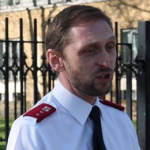
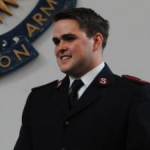

 CTC’s Communications Officer Andy Walton preached last Sunday (16 February 2014) at St Peter’s Bethnal Green, as part of its “Just Church” sermon series on mercy, justice and evangelism.
CTC’s Communications Officer Andy Walton preached last Sunday (16 February 2014) at St Peter’s Bethnal Green, as part of its “Just Church” sermon series on mercy, justice and evangelism.












